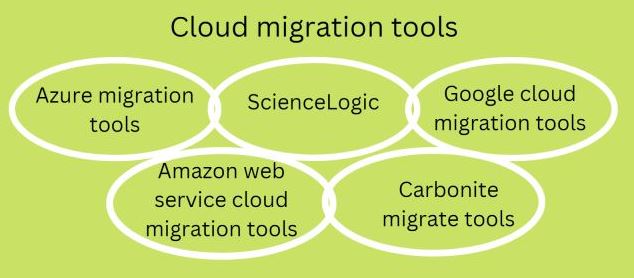
How to Recognize the Cloud Migration That's Right for You
pThere are several ways to recognize a cloud backup thats right for you like choosing between public and private cloud choosing your preferred cloud computing services evaluating your current environment identifying cloud provider security considerat
Many people have kept asking us how they can recognize the proper cloud migration for their business. I want to answer as many people as possible, so I thought it wise to write this article. Keep on reading to get the answer to the question of how to know if cloud migration is proper for you.
There are several ways to recognize a cloud backup that's right for you, like; choosing between public and private cloud, choosing your preferred cloud computing services, evaluating your current environment, identifying cloud provider security considerations, determining cost-effectiveness, and much more.
As you learn tips on recognizing a cloud migration that's right for you, get to know more about what to consider in your cloud migration tool.
How to Recognize the Cloud Migration That's Right for You
The cloud can be an excellent option for many businesses, but many cloud providers and services can make it challenging to figure out which one will be best for your company. You may know that cloud computing has become popular in recent years, with over 80% of companies using it, according to Forbes, but knowing why cloud computing can benefit your business, in general, isn't enough.
You need to know precisely what cloud migration will work best for you and your business model. Here are some tips on recognizing the right cloud migration option for you.
1. Choosing Between Public and Private cloud
Public and private cloud have their advantages. Ultimately, it will depend on your business needs-this is why evaluating what type of migration can provide the best solution for you and your company is essential. For example, the public cloud could be a good option if cost savings are a priority. However, a private cloud might be better if data privacy or security are top priorities.
2. Choosing Your Preferred Cloud Computing Services
Depending on your needs, one of these cloud service providers might be a better fit than the others. The different services available are tailored to suit individual needs, so it's essential to find the one that best matches what you're looking for. If you're unsure where to start, this guide can help determine which option will work best for your business.
Amazon Web Services has opportunities ranging from primary storage and compute options to highly scalable and flexible infrastructure-as-a-service (IaaS) and platform-as-a-service (PaaS) offerings. Microsoft Azure is another popular choice, offering everything from IaaS and PaaS options to end-user productivity apps. Google Cloud Platform also provides an array of pricing plans with varying performance levels depending on your workload.
3. Evaluating Your Current Environment
To help you with your cloud migration, we'll first need to evaluate what you currently have in place. Your current environment is the hardware and software in use and will go into business after your migration. The three critical pieces of information about your current environment are its reliability, stability, and dependability.
4. Determining cost-effectiveness
When looking at cloud migration as a cost-effective solution, it's essential to be able to forecast your future workloads and budgets. If you find that your workloads consistently surpass capacity or stay relatively low, then migrating may not be worth it. It's essential to weigh both sides of migration before jumping in head first.
5. Identifying Cloud Providers
There are a lot of cloud providers to choose from, and deciding which one is right for you depends on many factors. Some of these are your need, how much data storage you will need, how often you access your data, what level of backup you want, and what platforms you need compatible with. Be sure to review all of these when deciding which provider will work best for you.
6. Identifying Cloud Provider Security Considerations
Knowing what security measures you need before making a migration is essential, as not all providers will meet your company's needs. Regardless of which provider you go with, ensure you understand the different levels of protection and ask any questions upfront so there are no surprises on either end.
7. All about Speed
The cost of running your operations can significantly determine if you should stay with on-premises or cloud hosting. Keep an eye out for what offers you better bandwidth, response time, and quicker transactions.
It's worth researching all of your options before making any decisions to ensure that you're satisfied with how quickly or frequently they respond to their customers.
What are the Top Cloud Migration Tools?
The best way to migrate your data from one cloud platform to another is by using these 5 best cloud migration tools. There are many migration tools, with new ones starting every day. Check the chart below.
What should you Consider When Choosing a Cloud Migration Tool
Moving to the cloud can be complicated and time-consuming, but cloud migration has some great benefits, including reduced costs and flexibility. However, selecting the right migration tool can be challenging, as many options on the market offer different features.
Below are some tips to help you choose the best cloud migration tool for your organization.
1. Data Location
Data is the most valuable asset for many organizations and, increasingly, for small businesses. Managing those assets is more challenging than ever with increased access to data through Cloud technologies like servers, personal computing, and mobile devices. Your data has more value in one place - on-premises or off-premises. The organization must actively manage data that resides on-premises using various safeguards.
2. Cost
Don't forget to include the cost in your decision-making process. Be sure to get quotes from the vendor for both on-premises and cloud options before making a final decision. It's also important to ask about hidden costs, such as implementation fees or per-user fees, that may not be clear upfront. If you have specific needs that one vendor doesn't meet, be prepared to conduct more research and talk with other vendors.
3. Security
Make sure the security of your data is paramount. You can only transfer data into the public cloud using an SSL encryption key with many tools. Also, ensure any sensitive information such as social security numbers and credit card numbers are stored in a different environment than less sensitive information.
4. Data Retention
Determines how long your data will be available, after which it can be overwritten or deleted. To keep the costs down, most providers require you to delete or archive your old backups periodically, and their price per gigabyte increases as the retention period gets longer.
5. Reliability
Reliability is one of the most critical features of any new system. Cloud migration tools, especially since they require more up-front investment than self-hosted versions, will be under much greater stress as your business expands and grows. If possible, research customer reviews and try the beta versions before committing. Is there a money-back guarantee? Does it offer onsite engineers or 24/7 support? The services your selected provider provides are critical since they could affect the quality of your data after it has been migrated.
6. Scalability
Understand the maximum expected volumes of data that your project will generate. Often, it may be unwise to place too much volume on one storage device. This could slow down your applications and cost you more money in the long run. Remember, it is best practice not to store all your data on one server at a time.
Conclusion
Choosing the proper cloud migration is crucial, but with this step-by-step process, you will have no trouble. Be sure to consider each of these factors and ask yourself which ones are most important to you. Not every business has what it takes to handle a cloud migration, so consider whether or not this could work for your company before proceeding any further. You can reach out to Guru solutions for all your cloud migration services.









